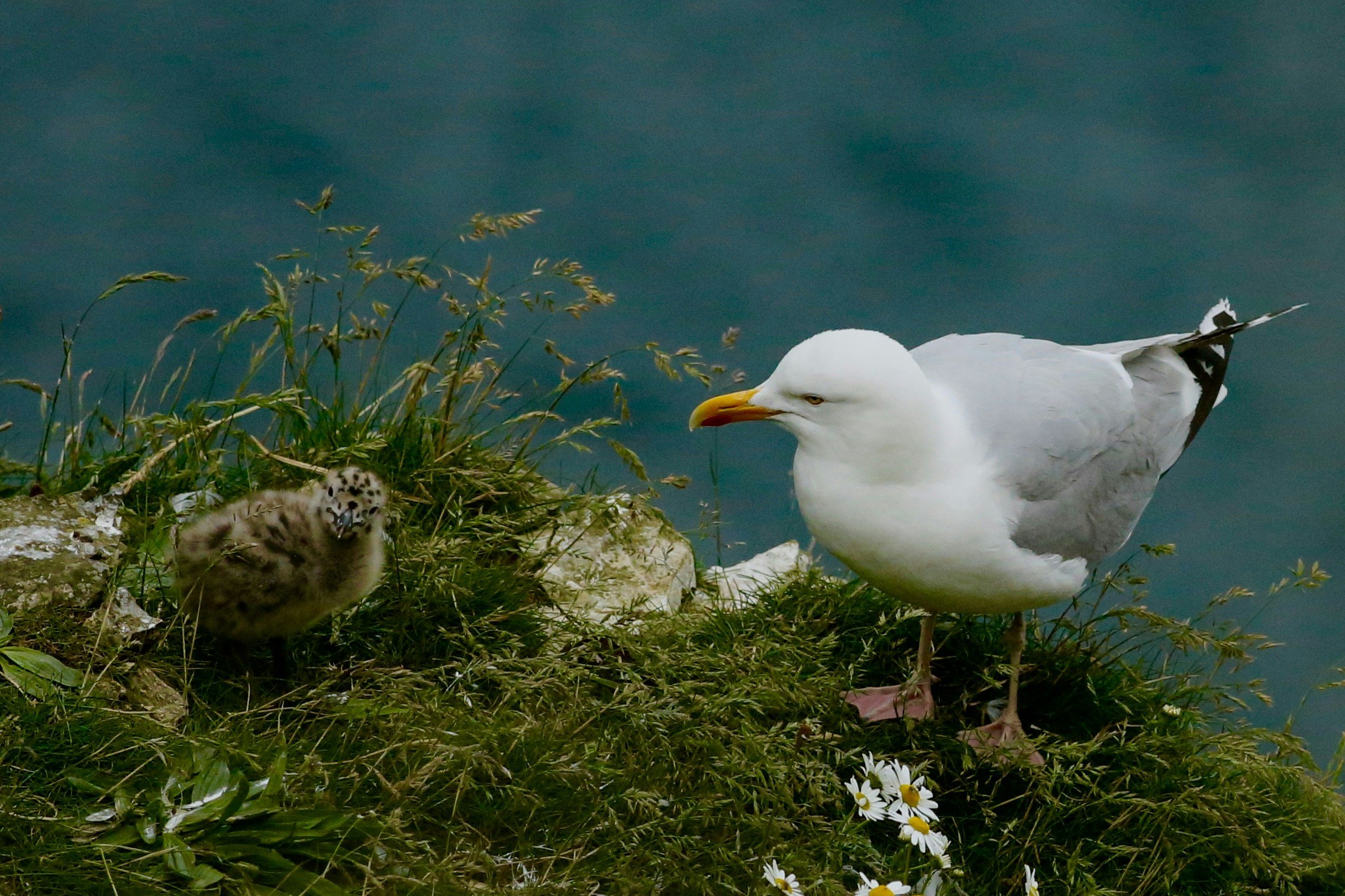
Our researchers
Michaël Beaulieu
Behavior | biologging | physiology | state of the field | welfare indicatorsCurrent projects
Examining the use of potential welfare indicators and wildlife monitoring methods to assess wild animal welfare
Encouraging various scientific communities to engage in wild animal welfare science
About Michaël
Michaël Beaulieu is a Senior Researcher at Wild Animal Initiative. Michaël’s research focuses on formulating recommendations for how to measure wild animal welfare most appropriately and efficiently. Based on the latest knowledge, his reviews and perspective articles are aimed at various scientific audiences, including researchers and students looking to expand their research activities to wild animal welfare science.
Experience & research
Before joining Wild Animal Initiative, Michaël was the scientific coordinator of the Hearing in Penguins project at the German Ocean Museum, which investigated the acoustic communication and hearing capacity of penguins. Prior to this, he was part of the RESPONSE research training group at the University of Greifswald (Germany), which examined the responses of various organisms to environmental changes.
Michaël’s earlier research focused on the ecophysiology and behavioral ecology of a variety of animals. This involved using descriptive approaches in the wild, as well as experimental approaches both in the wild and in the laboratory. Michaël has undertaken extensive field research on penguins in Antarctica, where he overwintered for 15 consecutive months. Outside of Antarctica, he has also conducted research on songbirds, bats, primates, and insects. During his research career, Michaël has delivered lectures in evolutionary ecology and animal ecology, and seminars in conservation, zoology, and animal ecology; led ornithological excursions in Northern Germany; served as a reviewer for numerous journals, research proposals, and book chapters; and supervised multiple students. He has also served as a naturalist guide in both Antarctica and the Arctic.
Education
Michaël earned his PhD in Ecophysiology and Behavioral Ecology from the University of Strasbourg (France). Based on a multidisciplinary approach combining behavioral and physiological measurements, his dissertation investigated how free-ranging Adélie penguins regulate their reproductive investment when facing increased breeding constraints. Michaël also holds a Veterinary Doctorate State Diploma from the National Veterinary School of Nantes (France) and a Habilitation degree (accreditation to supervise research) from the University of Greifswald (Germany).
Michaël’s Library posts
Selected publications
*Beaulieu, M. (2025). Rehabilitating wild animal welfare: A focus on veterinary rescue and rehabilitation interventions. Research in Veterinary Science, https://doi.org/10.1016/j.rvsc.2025.105582
*Beaulieu, M. (2024) Capturing wild animal welfare: A physiological perspective. Biological Reviews, 99(1), 1–22. https://doi.org/10.1111/brv.13009
*Beaulieu, M. (2024). Oxidative status: A general but overlooked indicator of welfare across animal species? BioEssays, 46(8), 2300205. https://doi.org/10.1002/bies.202300205.
*Beaulieu, M., & Masilkova, M. (2024). Plugging biologging into animal welfare: An opportunity for advancing wild animal welfare science. Methods in Ecology & Evolution. https://doi.org/10.1111/2041-210X.14441
Dederichs, A., Fischer, K., Michalik, P., & Beaulieu, M. (2024). Enhanced dispersal capacity in edge population individuals of a rapidly expanding butterfly. Ecology & Evolution 14, e10885. https://doi.org/10.1002/ece3.10885
Rößler, H., May, A., Dähne, M., & Beaulieu, M. (2022). Long and winding road: Training progress and trainability variation across a psychoacoustic experiment in penguins. Applied Animal Behaviour Science 256, 105764. https://doi.org/10.1016/j.applanim.2022.105764
Beaulieu, M., Dähne, M., Köpp, J., Marciau, C., Kato, A., Ropert-Coudert, Y., & Raclot, T. (2021). Exploring the interplay between nest vocalizations and foraging behaviour in breeding birds. Animal Behaviour 180, 375-391. https://doi.org/10.1016/j.anbehav.2021.08.015
Beaulieu, M., Touzalin, F., Dool, S., Teeling, E. C., & Puechmaille, S. P. (2020). Timescale and colony dependent relationships between temperature anomalies and plasma oxidative markers in a long-lived bat species. Conservation Physiology 8(1), coaa083. https://doi.org/10.1093/conphys/coaa083
Fragueira, R., & Beaulieu, M. (2019). Red does not always outperform black: Morph-specific behavioral variation in response to environmental changes. Animal Behaviour 148, 81-91. https://doi.org/10.1016/j.anbehav.2018.12.006
Günter, F., Beaulieu, M., Brunetti, M., Lange, L., Schmitz Ornés, A., & Fischer, K. (2019). Latitudinal and altitudinal variation in ecologically important traits in a widespread butterfly. Biological Journal of the Linnean Society 128(3), 742-755. https://doi.org/10.1093/biolinnean/blz133
Le Guen, C., Kato, A., Raymond, B., Barbraud, C., Beaulieu, M., Bost, C. A., MacIntosh, A. J. J, Meyer, X., Raclot, T., Sumner, M., Takahashi, A., Thiebot, J. B., & Ropert-Coudert, Y. (2018). Reproductive performance and diving behaviour share a common sea-ice optimum in Adélie penguins (Pygoscelis adeliae). Global Change Biology 24(11), 5304–5317. https://doi.org/10.1111/gcb.14377
Beaulieu, M., Benoit, L., Abaga, S., Kappeler, P. M., & Charpentier, M.J.E. (2017). Mind the cell: Seasonal variation in telomere length mirrors changes in leukocyte profile. Molecular Ecology 26, 5603-5613. https://doi.org/10.1111/mec.14329
Beaulieu, M., Geiger, R. E., Reim, E., Zielke, L., & Fischer, K. (2015). Reproduction alters oxidative status when it is traded-off against survival. Evolution 69(7), 1786–1796. https://doi.org/10.1111/evo.12697
Beaulieu, M., & Costantini, D. (2014). Biomarkers of oxidative status: Missing tools in conservation physiology. Conservation Physiology 2(1), cou14. https://doi.org/10.1093/conphys/cou014.
Beaulieu, M., Mboumba, S., Willaume, E., Kappeler, P. M., & Charpentier, M. J. E. (2014). The oxidative cost of unstable social dominance. Journal of Experimental Biology 217(15), 2629-2632. https://doi.org/10.1242/jeb.104851.
Beaulieu, M., & Schaefer, H. M. (2013). Rethinking the role of dietary antioxidants through the lens of self-medication. Animal Behaviour 86(1), 17–24. https://doi.org/10.1016/j.anbehav.2013.05.022
Beaulieu, M., & Sockman, K. W. (2012). One meadow for two sparrows: Resource partitioning in a high elevation habitat. Oecologia 170(2), 529–540. https://www.jstor.org/stable/41686261
Beaulieu, M., & Sockman, K. W. (2012). Song in the cold is ‘hot’: memory of and preference for sexual signals perceived under thermal challenge. Biology Letters 8(5), 751–753. https://doi.org/10.1098/rsbl.2012.0481
Matragrano, L. L., Sanford, S. E., Sockman, K. W., Salvante, K. G., Beaulieu, M., & Maney, D. L. (2012). Estradiol-dependent modulation of serotonergic markers in auditory areas of a seasonally breeding songbird. Behavioral Neuroscience 126, 110–122. https://doi.org/10.1037/a0025586
Beaulieu, M., Reichert, S., Le Maho, Y., Ancel, A., & Criscuolo, F. (2011). Oxidative status and telomere length in a long-lived bird facing a costly reproductive event. Functional Ecology 25(3), 577–585. https://doi.org/10.1111/j.1365-2435.2010.01825.x
Ancel, A., Beaulieu, M., Le Maho, Y., & Gilbert, C. (2009). Emperor penguin mates: Keeping together in the crowd. Proceedings of the Royal Society B 276(1665), 2163–2169. https://doi.org/10.1098/rspb.2009.0140
*Denotes papers published while working at Wild Animal Initiative.




